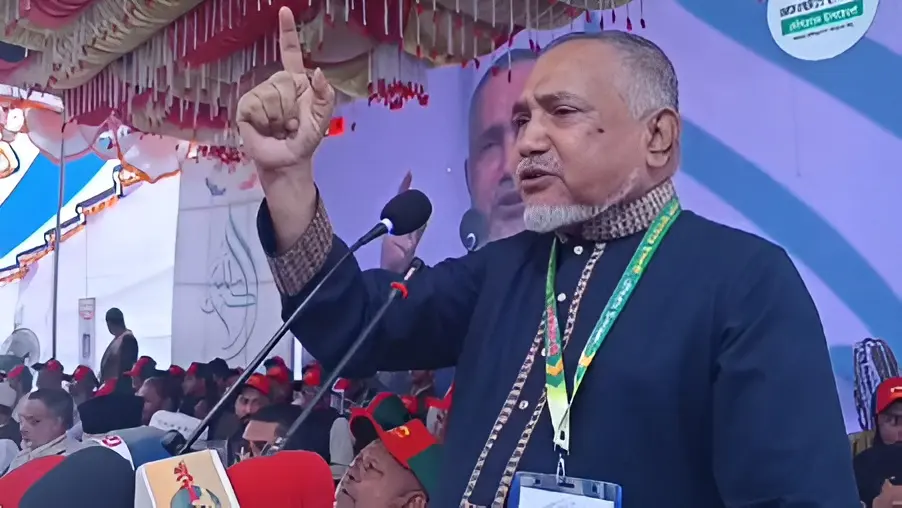
Bangladesh Jamaat leader warns of Ghazwa-e-Hind, claims 50 lakh youth ready to fight India if provoked
50 Lakh Youth, One Threat: Bangladesh Jamaat Leader’s War Cry Against India
Published: September 28, 2025 | By: Rapid Updates News Team
A Shocking Statement from New York
Ghazwa-e-Hind – In a bold and controversial speech delivered in New York, Syed Abdullah Muhammad Taher, the deputy leader of Bangladesh’s Jamaat-e-Islami party, claimed that 50 lakh Bangladeshi youth are ready to fight India in a war he referred to as “Ghazwa-e-Hind.” This term, often used by radical Islamist groups, refers to a prophesied holy war aimed at conquering the Indian subcontinent.
Taher made this statement during a public reception organized by the Bangladesh American Association. He suggested that if India were to intervene militarily in Bangladesh after Jamaat comes to power, it would trigger a massive response from Bangladeshi youth. “I pray that India enters,” he said, “so we can erase the stigma of 1971 and prove ourselves as true freedom fighters.”
What Is Ghazwa-e-Hind and Why It Matters
The term “Ghazwa-e-Hind” is rooted in certain Islamic texts and is interpreted by some radical groups as a divine mission to conquer India. While mainstream scholars reject this interpretation, extremist factions have used it to justify militant actions and threats.
Taher’s invocation of this term is alarming not only because of its religious undertones but also because it signals a shift in political rhetoric. By framing potential conflict with India as a holy war, Jamaat-e-Islami is attempting to rally support among conservative and radical segments of the Bangladeshi population.
Analysts warn that such language could destabilize regional peace and provoke unnecessary tensions between India and Bangladesh. The reference to 50 lakh youth ready for war adds a dangerous layer of militarization to what is essentially a political narrative.
Political Turmoil and Rise of Radicalism in Bangladesh
Bangladesh has been experiencing political instability since the ouster of Prime Minister Sheikh Hasina in August 2024. The interim government led by Nobel laureate Muhammad Yunus has faced criticism for allegedly allowing radical elements to gain influence.
Reports suggest that efforts are underway to reshape the Bangladesh Army into an Islamic military institution, similar to Iran’s Revolutionary Guard Corps. This transformation, if true, could have serious implications for regional security and democratic governance.
Jamaat-e-Islami, a party known for its pro-Pakistan stance during the 1971 liberation war, has long been accused of harboring extremist ideologies. Taher’s recent statement appears to be an attempt to rebrand the party as a nationalist force, using anti-India sentiment as a rallying point.
India’s Response and Regional Implications
So far, the Indian government has not officially responded to Taher’s remarks. However, security experts believe that such threats cannot be ignored. The idea of 50 lakh youth being mobilized for war, even if exaggerated, reflects a growing radicalization that could spill over borders.
India and Bangladesh share deep cultural, economic, and historical ties. Any disruption in this relationship could affect trade, border security, and regional cooperation. The threat of Ghazwa-e-Hind, especially when voiced by a senior political figure, risks undermining years of diplomatic progress.
Civil society groups in Bangladesh have condemned Taher’s statement, calling it irresponsible and dangerous. Many fear that such rhetoric could incite violence and deepen divisions within the country. Meanwhile, international observers are closely watching the situation, urging restraint and dialogue.
Also read: BSF Nabs Senior Bangladesh Police Officer Sneaking Into West Bengal